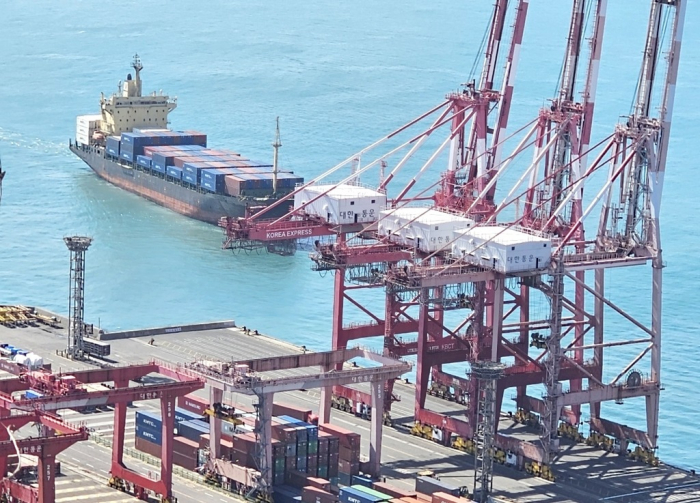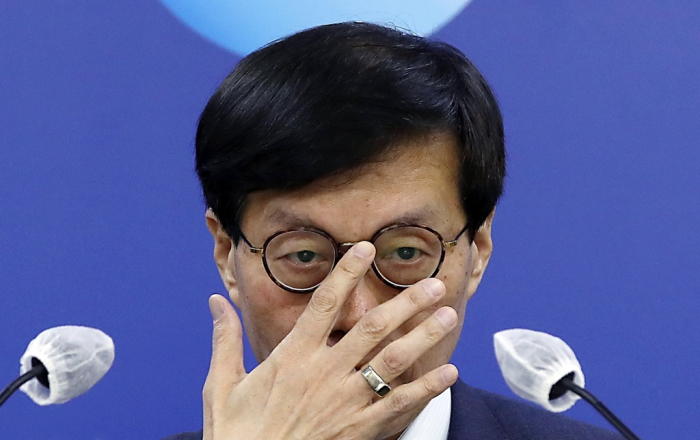Economy
Korean economy unlikely to rebound in H2; BOK may keep rate
The economy may miss the IMF’s growth forecast of 1.5% this year, according to a KED survey; majority sees no more rate hikes
By Apr 13, 2023 (Gmt+09:00)
3
Min read
Most Read
LG Chem to sell water filter business to Glenwood PE for $692 million


KT&G eyes overseas M&A after rejecting activist fund's offer


Kyobo Life poised to buy Japan’s SBI Group-owned savings bank


StockX in merger talks with Naver’s online reseller Kream


Meritz backs half of ex-manager’s $210 mn hedge fund



South Korea’s economy is unlikely to rebound in the second half as exports are expected to stay weak on the sluggish global semiconductor industry and a slow recovery in domestic demand, which may prevent the central bank from further raising interest rates, a survey showed.
Asia’s fourth-largest economy is predicted to grow less than 1.5% this year, below a forecast of 1.6% by the Bank of Korea and the finance ministry, according to a poll of 50 economists and financial experts by The Korea Economic Daily released on Thursday.
“Exports are likely to remain stagnant and a recovery in domestic demand is likely to be delayed due to high household debt,” said Hong Kiyong, a business administration professor at Incheon National University. “It won’t be easy to rebound within this year.”
The country is poised to suffer a trade deficit in April for 14 straight months as exports in the first 10 days of the month skidded 8.6% with the overseas sales of semiconductors, the country’s top export item, down 40%. South Korea is home to the world’s two largest memory chipmakers – Samsung Electronics Co. and SK Hynix Inc.
The International Monetary Fund on Tuesday cut its forecast for South Korea’s economic growth for this year by 0.2 percentage points to 1.5%. But 58% of the survey participants expected the economy to miss the prediction, while 8% foresee an expansion of less than 1%.
The economy is likely to rebound next year at the earliest with 48% expecting a recovery in the first half of 2024 and 16% predicting not until the second half of next year. Only 28% saw a recovery in the July-December 2023 period.
Participants expected any recovery to be modest, with 74% anticipating a slow rebound and 13% seeing low growth.
“A rebound will not mean an economic boom,” said Kim Hyon-Wook, an associate dean of the KDI School of Public Policy and Management.
RATE HIKES OVER?
Given the dismal outlook and slowing inflationary pressure, 54% of the survey participants expected the BOK to keep its policy interest rate at the current 3.50%.
The BOK said earlier this week consumer inflation will continue to moderate and decline to the 3% range from the second quarter of this year.
“I expect growth and inflation to be lower than the BOK’s forecasts,” said Yoon Yeo-sam, an analyst at Meritz Securities Co., predicting the central bank to cease its tightening campaign.
The central bank is likely to start lowering interest rates next year with 54% expecting a reduction in the first half and 6% predicting a cut in the second, the survey showed.
WIDENING INTEREST RATE GAPS WITH US
The BOK needs to raise the base interest rate further, however, given the widening differentials of borrowing costs in South Korea and the US, 43% of the survey participants said.
The Federal Reserve may raise its policy rate to a range of 5.00-5.25% in May, according to foreign media, increasing the gap to up to 1.75 percentage points.
“It will be hard (for the BOK) to hike rates further, given the domestic economy. But the interest rate differentials with the US are a problem,” said Yi Insil, the head of the Korean Peninsula Population Institute for Future.
“The BOK will have to raise the rate one more time as a 1.75 percentage point-gap would be burdensome,” said Yi, a former president of the Korean Economic Association and economics professor at Sogang University.
Hansung University’s economics professor Kim Sang Bong said the monetary authority needs to ramp up the policy rate to 4.00%.

BOK Governor Rhee Chang-yong on Tuesday defied market views that the monetary authority may have ended its rate hike cycle, citing growing uncertainties over inflation.
Write to Jin-gyu Kang at josep@hankyung.com
Jongwoo Cheon edited this article.
More to Read
-
 Central bankBOK chief says tightening not over after rate freeze
Central bankBOK chief says tightening not over after rate freezeApr 11, 2023 (Gmt+09:00)
3 Min read -
 EconomyAverage household debt in South Korea exceeds $69,000 so far this year
EconomyAverage household debt in South Korea exceeds $69,000 so far this yearDec 01, 2022 (Gmt+09:00)
2 Min read
Comment 0
LOG IN


